Jasna Plevnik at the China-CEEC Institute's seminar in Budapest
- Details
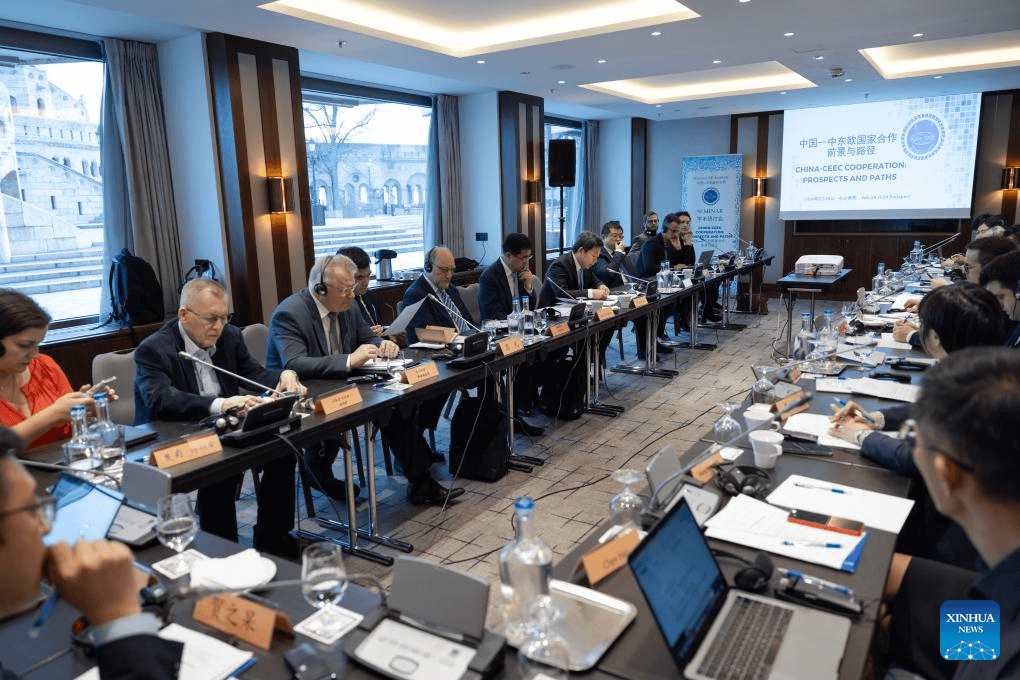
BUDAPEST- 29-Februray-2024- Chinese and European experts discussed how to upgrade coopereation between China and Europe. Photo: Xinhua.
Zhao Zhimin, Secretary-general of the CASS: China wanted to see a strong Europe but not a unipolar world
Talking about climate change Professor Zhao underlined that it would endanger living conditions for people underling that President of China Xi Jinping has supported and promoted the Paris Agreement by radical measures to protect climate in China, globally and regionally.
He reminded of the global financial crisis in 2008. When China helped the USA and the world to rise from the crisis but the USA had forgotten that.
Panel I, entitled „China-CEE Cooperation in the Context of Sino-European Relations“ was moderated by Prof. Dr. Feng Zhongping, Director General, Institute of European Studies Chinese Academy of Social Sciences, and President of China-CEE Institute.
Panel II was about Pragmatic Cooperation between China and CEEC: Ideas and Approaches and the moderator was Prof. Dr. Liu Zuokui, Deputy Director of the Institute of European Studies, Chinese Academy of Social Sciences, Vice President of China-CEE Insitute.The moderators provided an in-depth analysis of China-CEEC cooperation and economic and geopolitical situation in Europe.
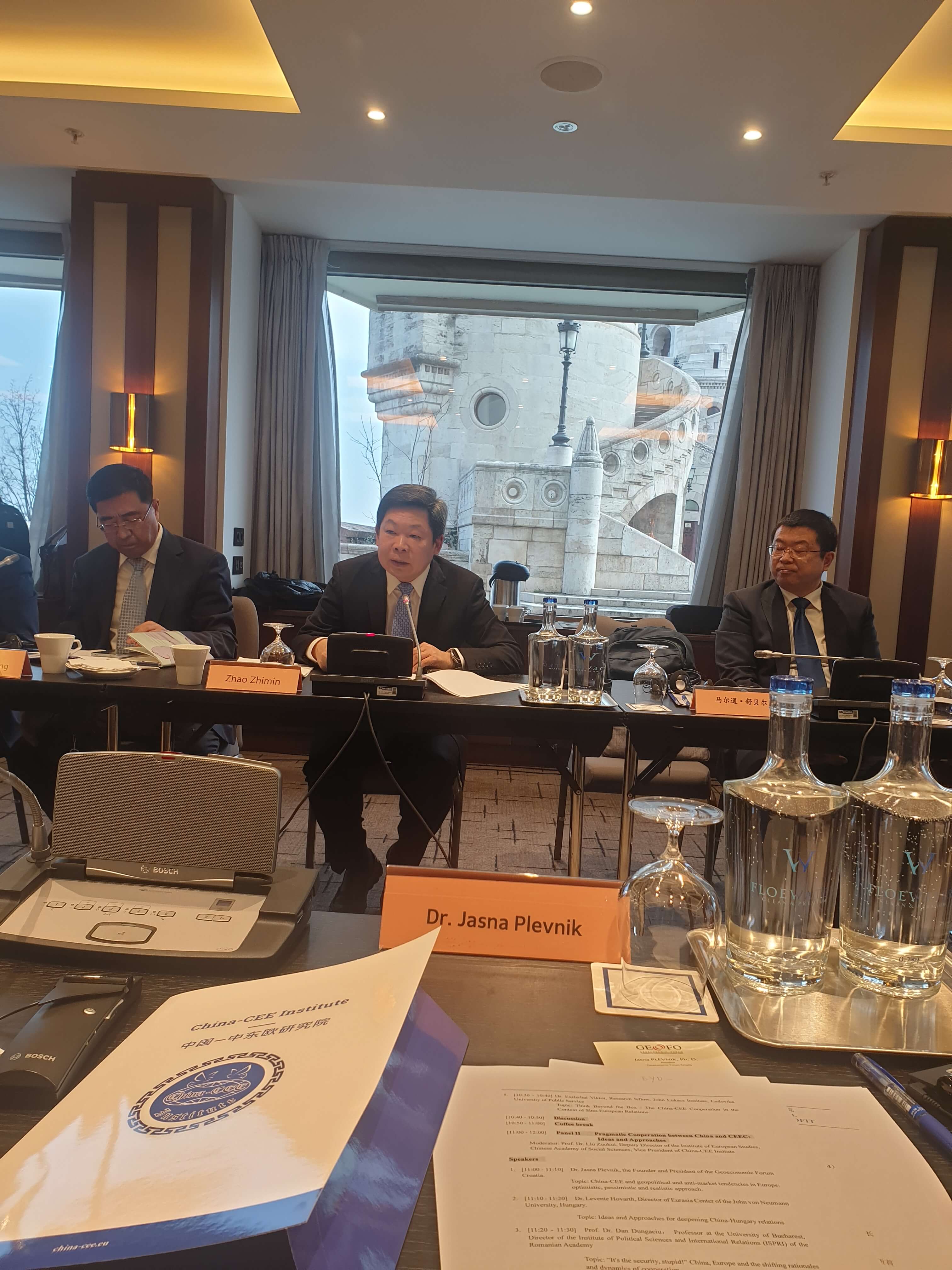
L/R Prof. Dr. Feng Zhongping, Prof. Dr. Zhao Zhimin, Secretary-general of the CASS and Prof. Dr. Liu Zuokui.
The Geoeconomic Forum’s President Jasna Plevnik: “China-CEEC and geopolitical and anti-market tendencies in Europe: Optimistic, Pessimistic and Realistic Approach”
Please find down here Jasna Plevnik’s integral speech.
“Good day to all. For more than a decade, the China-CEEC's influence, and achievements have been superior to the expectations of its critics, and the platform certainly may continue to do so in the future.
However, for China-CEEC has become pivotal to research and answer on those new geopolitical and economic tendencies in Europe that gradually transform European foreign policy, its economy, global identity, and security concept. It means Europe has changed and China-CEEC should change. Status quo should not be an option.
Europe is now exposed to the onset of a new phase of militarisation directly, and indirectly through financing the war in Ukraine. At present, 30% of all funding for Ukraine comes from Europe. The growth of military investments of European NATO members might radically diminish investments of European governments into projects of public interest. To put it strongly, the militarisation of Europe could narrow space for China-CEEC’s “shared development” projects.
Then, the EU’s concept and policies of building an interconnected world based on free trade, global supply chains, and fair competition have been undermined by recent geopolitical developments in Europe and by following America’s concept of the world order.
I would like, from an optimistic, pessimistic, and realistic perspective, to discuss how China-CEE cooperation could be influenced by three factors: the relations between major world powers, the economic situation in China, and the upcoming elections in Europe.
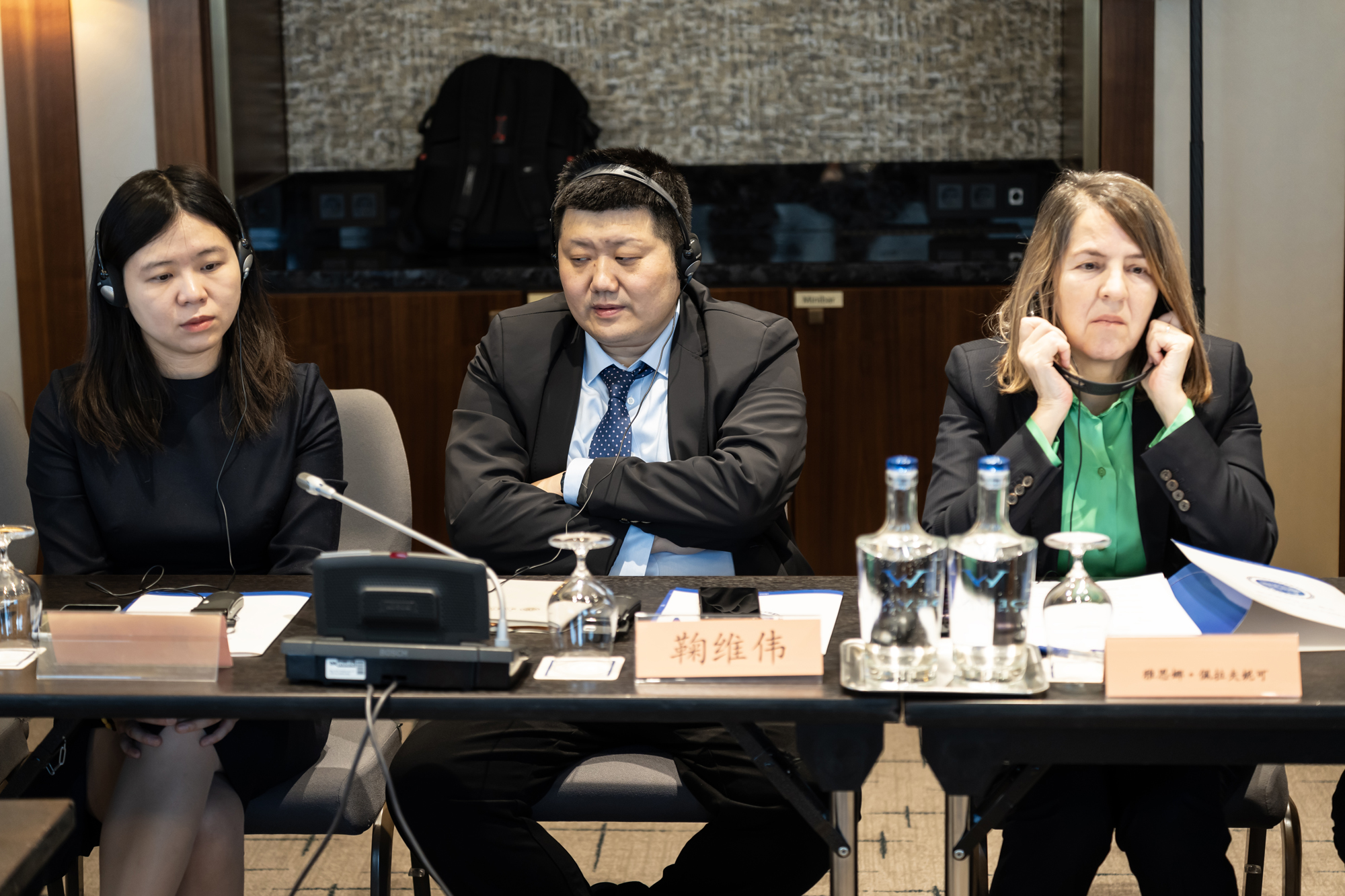
L/R: Dr. Jia Yin, Dr. Ju Weiwei and Dr. Jasna Plevnik.Photo by Peter Szudy, China-CEE Institute
The Optimistic Approach
We all here very well know that the situation in the world is anything but optimistic. However, there have been optimistic signs of the rapprochement between China and the USA after the San Francisco meeting in November 2023, and that positive development could spill over into Europe-China relations. We have seen much evidence in the past few years that China-EU relations remarkably depend on China-USA relations.
The European Union's approach to decoupling, deglobalization, and de-risking, which has started in Washington, not in Brussels, has been more verbal than strategic, because those policies and new ideologies of deglobalisation cannot be fully implemented without seriously damaging the EU’s interests. India, Vietnam, or Nepal where the average salary is below 200 dollars cannot replace the Chinese market for European companies.
The second reason for optimism lies in the fact that China's political support for China-CEEC cooperation stays firm. China-CEEC is an important part of China's regional European policy so China's loyalty to the platform continues even though the CEEC market is not crucial for China's economic growth.
Then, elections will be held across Europe very soon and here there could also room for some optimism. The current political elite of the European Union has low approval ratings no more than 25 percent and that might be an opportunity for the election of new European Commission that could revive cooperation with China as it was from 2013 to 2017 when Brussels was not concerned that China- CEEC cooperation or the BRI would endanger the Western political system and economic progress and the EU had its own policy towards China.
The Pessimistic Approach
The pessimists think that we live in the Pre - War World Order. If so, Sino-American relations will continue to decline, Europe will follow that road and it will negatively affect the EU-China 2020 Strategic Agenda for Cooperation, and consequently China - CEEC cooperation.
The second, pessimist approach counts on a slowdown in the growth of China that could produce a shrinking of China's diplomacy activities in Europe.
The third, according to the logic of pessimism if elections in the European Union do not bring new leadership China - CEEC will be even more exposed to the EU's economic security agenda including possibilities of sanctions, trade war, even radical measures for the revision of the foreign direct investment and monitoring research and development.
If anti-China actors prevail in the EU's institutions, they could even trigger a new momentum of irrationality in relations with China. I would like to remind you of the headlines in some mainstream European media that Chinese products, like giant cranes in seaports, seafood, and electric vehicles, were spying in Europe and the USA. A week ago, a genetics journal from a leading scientific publisher retracted 18 papers from China due to concerns about “human rights.” It is very pessimistic!
The Realistic Approach
The reality remains as hard as ever. The EU will not disengage from the USA but will carefully manage tensions with China to avoid derailing bilateral relations.
At the risk of being wrong, I think that the creation of new projects and new alliances within the China-CEEC model of cooperation will be still exposed to the possibility of the reduction of the number of the partner countries from East Europe.
China's global economic power has not decreased or reached its peak though China , like all of Europe, facing economic challenges. China’s share of global GDP and exports has grown, and its global influence will continue to rise.
China-CEEC diplomacy stays remarkable by itself, then as a tool of the BRI in Europe, while implementation of the Global Civilization Initiative(GCI) opens to it a new perspective in Sino-European civilization exchanges.
Serbia, Hungary, and Poland's success within the China-CEEC framework will influence other states to reengage with China.
It is realistic to expect that new European Commission will not be directly against China- CEEC cooperation regardless of the new economic security strategy. Investigations over Chinese subsidies or control of exports and import will continue but mutual positions will be found. Reality asks that. Thanks for listening!
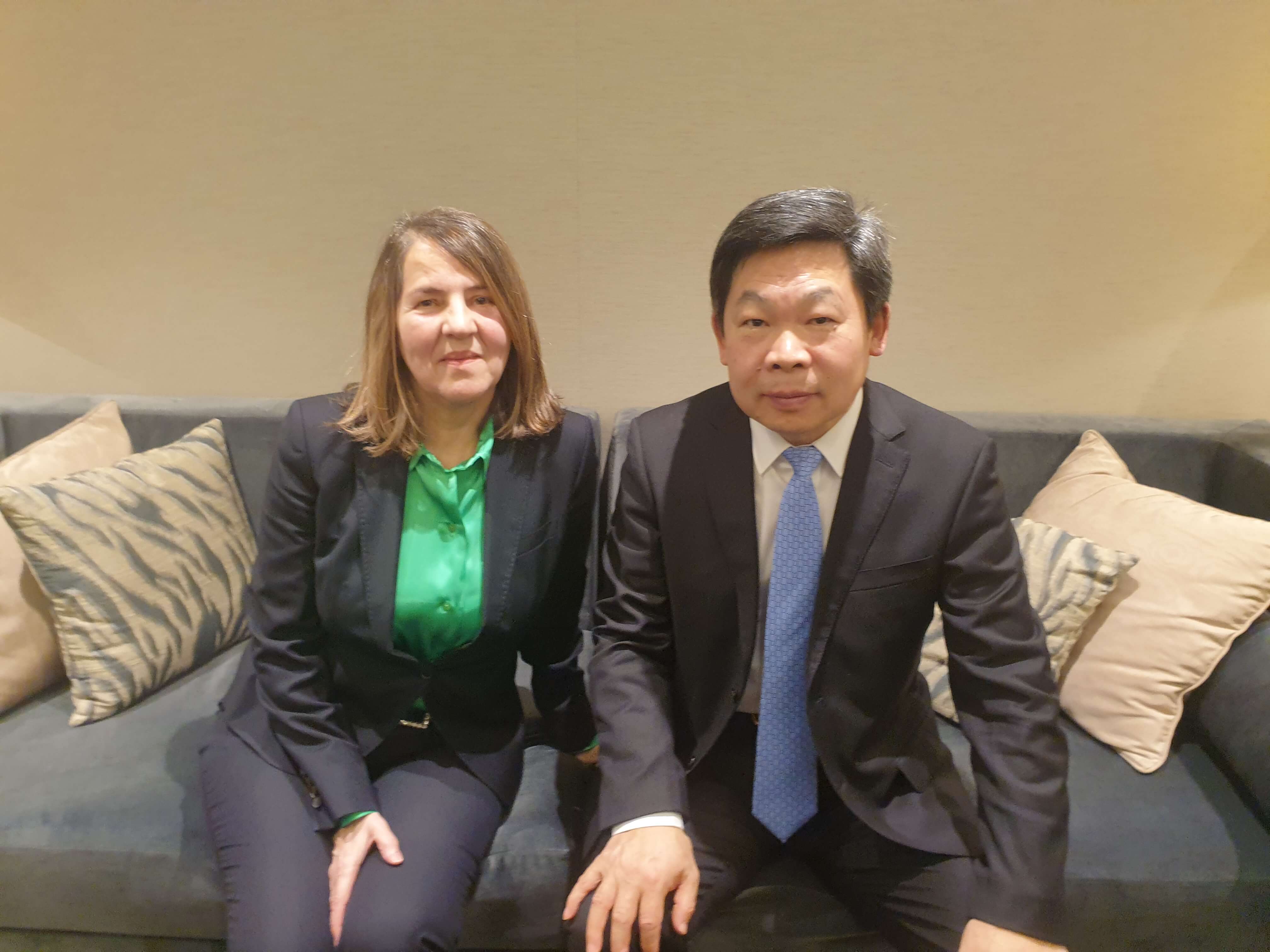
Prof. dr. Zhao Zhimin, Secretary-general of the Chinese Academy of Social Sciences and Dr. Jasna Plevnik, Founder and President of the Geoeconomic Forum Croatia.
The participants of the seminar on China-CEEC Cooperation: Prospects and Paths
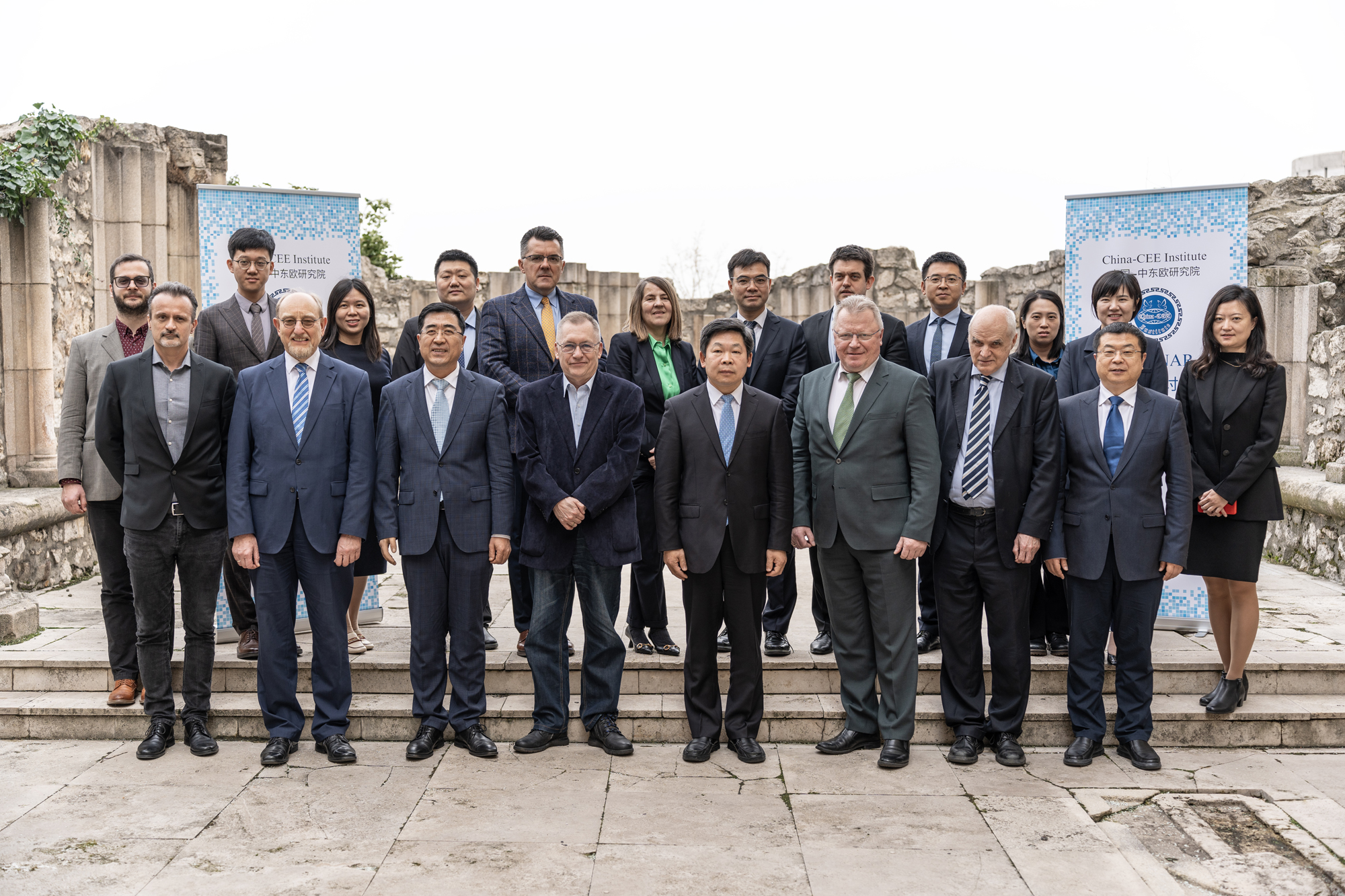
Photo by Peter Szudy, China-CEE Institute
Prof. Dr. Eberhard Sandschneider, Professor Freie Universität Berlin,Former Director of German Council on Foreign Relations(DGAP
Ambassador Dr. Heinrich Kreft, Professor for Diplomacy, Andrássy University Budapest
Prof. Sándor Zoltán KUSAI, Associate Professor, Pázmány Péter Catholic University, Former Ambassador of Hungary to China, Mongolia and the DPRK
Dr. Eszterhai Viktor, Research fellow, John Lukacs Institute, Ludovika University of Public Service
Dr. Jasna Plevnik, the Founder and President of the Geoeconomic Forum Croatia.
Dr. Levente Horváth, Director of Eurasia Center of the John von Neumann University, Hungary.
Prof. Dr. Dan Dungaciu,Professor at the University of Bucharest, Director of the Institute of Political Sciences and International Relations (ISPRI) of the Romanian Academy
Dr. Csaba Moldicz, Associate Professor, Head of the School of International Relations, Head of the Center for International Economy
Prof. Dr. Ferenc Banhidi,Researcher of Modern East Asia Research Group,PázmányPéter, Catholic University
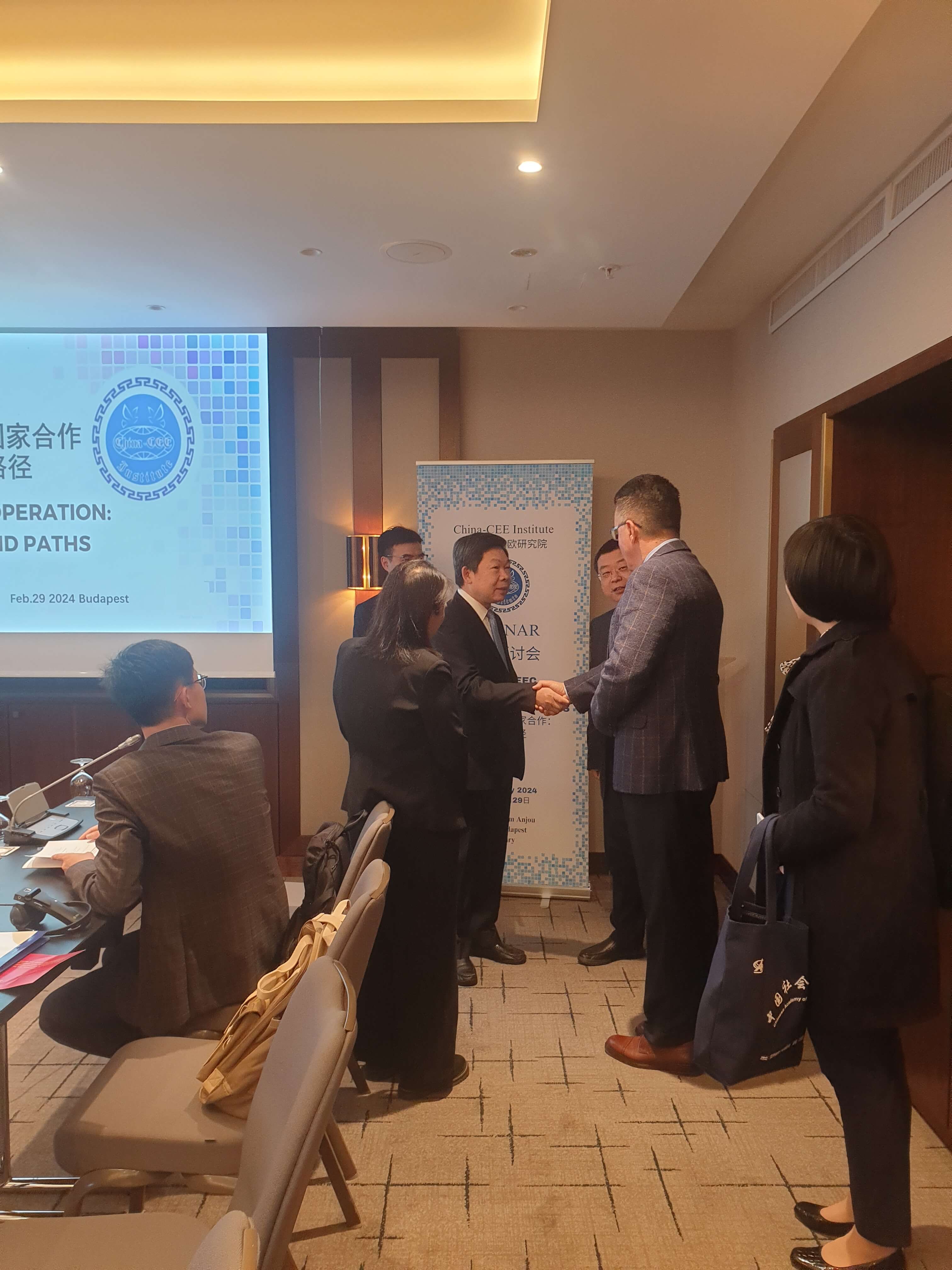
Before the opening of the Seminar:Prof. dr. Zhao Zhimin, Secretary-General of the CASS greets Prof. dr. Dan Dungaciu.